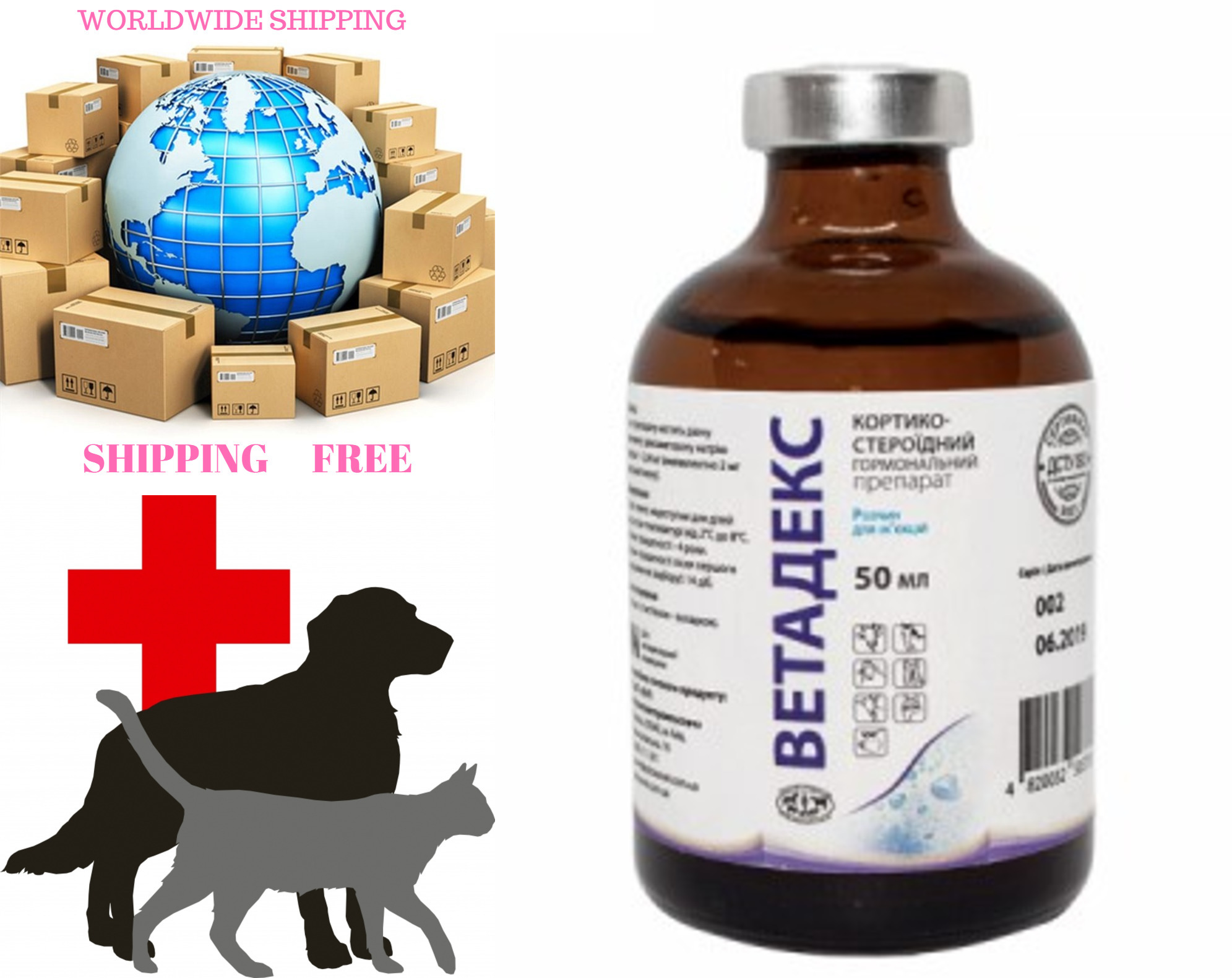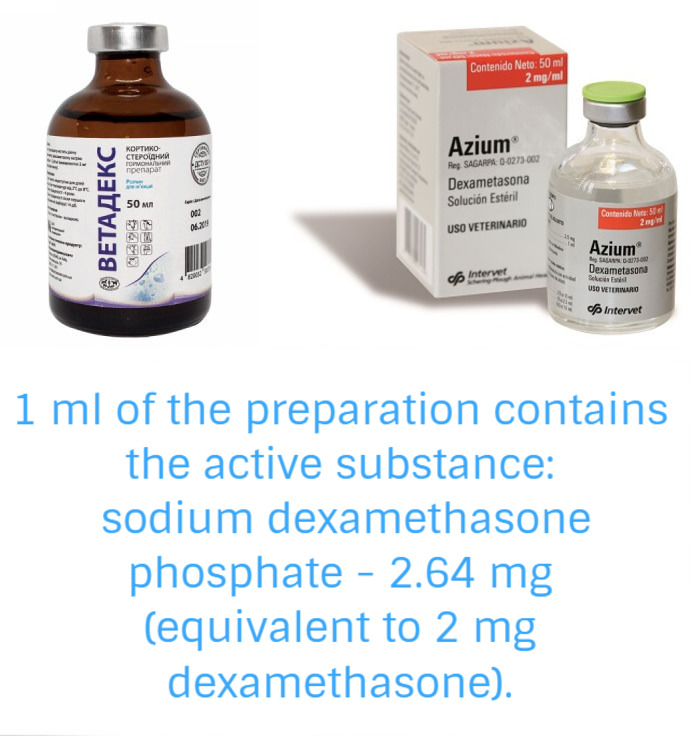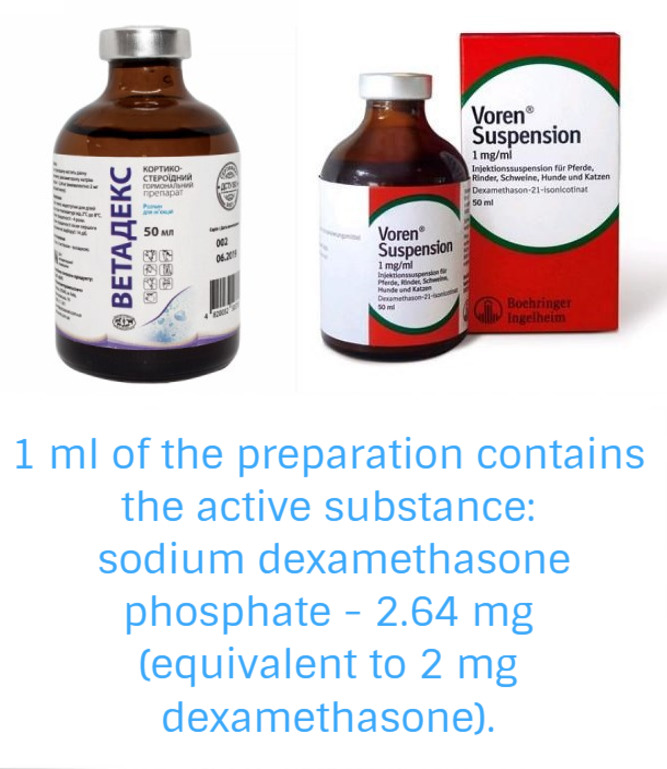Description
ATC-vet classification code:
QH02AB
Composition
1 ml of the preparation contains
the active substance:
sodium dexamethasone phosphate – 2.64 mg
Prescription:
Ketosis, arthritis, periarthritis, tendovaginitis, bursitis, sprains, inflammation of muscles, bones and tendons, acute mastitis, methythritis, pneumonia, eczema, hives, itching.
Pharmacological properties:
Dexamethasone is a synthetic analog of glucocorticosteroid hormone of adrenal cortisol (hydrocortisone). It has anti-inflammatory, anti-allergic, desensitizing, immunodepressant, antishock and antitoxic effects. Mineralocorticoid effect is insignificant.
Dexamethasone depresses all phases of inflammation:
It inhibits phospholipase A2, thus impairing the formation of prostaglandins and leukotriens. In addition, dexamethasone stabilizes cell membranes, lysosomes membranes, reduces capillary permeability, inhibits the migration of neutrophils and macrophages to the inflammation center and their phagocytic activity, inhibits the proliferation of fibroblasts and the formation of collagen and cytokines. It also inhibits synthesis and disrupts the kinetics of T-lymphocytes and reduces their cytotoxic activity. Dexamethasone has a counterinsular effect (it stimulates glucoseogenesis in the liver, reduces the permeability of glucose membranes, causes hyperglycemia and glucosuria).
Dexamethasone aqueous solutions are quickly absorbed by intramuscular or subcutaneous administration. Its maximum concentrations in plasma are reached 30 minutes after insertion. Dexamethasone is well distributed throughout the body. Its pharmacological effect is maintained for 2-4 days.
Dexamethasone is metabolized in the liver, partially forming conjugates with glucuronic acid. It is excreted with urine, in small amounts – with faeces.
The order of application of the drug:
Dexakel 02 is used for non-infectious acute inflammatory processes in the skeletal-muscular system (at arthritis, periarthritis, tendovaginitis, bursitis, sprains, myositis, contusions); acute infectious diseases (in addition to etiotropic therapy); allergic conditions (asthma, allergic skin lesions, snake bites); metabolic disorders (ketosis in cattle and toxaemia of pregnant sheep); for the artificial inducement of ruminant delivery in the last stages of pregnancy; in shock and stress conditions (collapse, anaphylaxis, trauma).
The drug is injected intramuscularly, intraarticularly;
dogs are allowed subcutaneous injection. Intravenous injection is used in the treatment of shock conditions.
Dose:
As an anti-inflammatory and anti-allergic agent:
Dogs: 0.25-0.5 ml / 11lb (5 kg) body weight (0.1-0.2 mg dexamethasone/2.2lb (1kg) body weight);
Horses, cattle: 5-10 ml / 880lb(400 kg) body weight (2.5-5 mg dexamethasone / 220lb(100 kg) body weight);
calves, sheep, goats: 1-2 ml / 110lb (50 kg) body weight (2-4 mg dexamethasone/50 kg body weight).
If necessary, the administration can be repeated in 2 days in dogs, in 3-4 days in other animals.
Artificially induced delivery in cows (used within one week before delivery): 2.5 ml /220lb(100 kg) body weight (5 mg dexamethasone/220lb(100 kg) body weight).
Postpartum toxaemia and artificial birth in sheep and goats: 6 ml /110lb (50 kg) body weight (2.5 mg dexamethasone/22lb (10 kg) body weight).
In case of shock: slow intravenous injection of a tenfold anti-inflammatory dose; can be repeated after 8-12 hours.
Intraarticular administration: based on lesion area and animal weight – 0.25-4 ml.
Storage:
Dry, dark, inaccessible to children at temperatures between 35-45F (2°C to 8°C).
From the date of manufacture – 4 years








Reviews
There are no reviews yet.